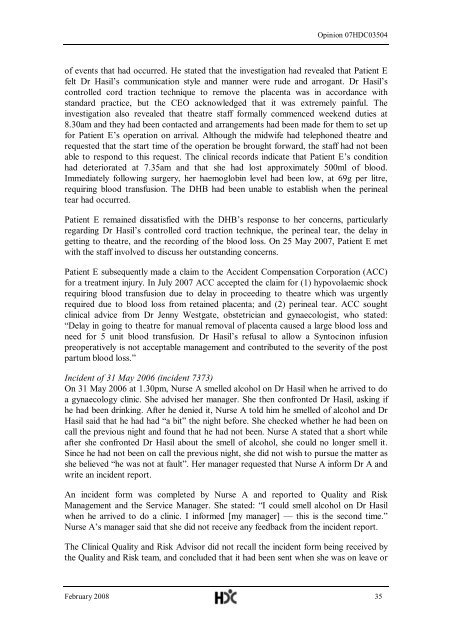Roman Hasil and the Whanganui DHB - Health and Disability ...
Roman Hasil and the Whanganui DHB - Health and Disability ...
Roman Hasil and the Whanganui DHB - Health and Disability ...
Create successful ePaper yourself
Turn your PDF publications into a flip-book with our unique Google optimized e-Paper software.
Opinion 07HDC03504<br />
of events that had occurred. He stated that <strong>the</strong> investigation had revealed that Patient E<br />
felt Dr <strong>Hasil</strong>’s communication style <strong>and</strong> manner were rude <strong>and</strong> arrogant. Dr <strong>Hasil</strong>’s<br />
controlled cord traction technique to remove <strong>the</strong> placenta was in accordance with<br />
st<strong>and</strong>ard practice, but <strong>the</strong> CEO acknowledged that it was extremely painful. The<br />
investigation also revealed that <strong>the</strong>atre staff formally commenced weekend duties at<br />
8.30am <strong>and</strong> <strong>the</strong>y had been contacted <strong>and</strong> arrangements had been made for <strong>the</strong>m to set up<br />
for Patient E’s operation on arrival. Although <strong>the</strong> midwife had telephoned <strong>the</strong>atre <strong>and</strong><br />
requested that <strong>the</strong> start time of <strong>the</strong> operation be brought forward, <strong>the</strong> staff had not been<br />
able to respond to this request. The clinical records indicate that Patient E’s condition<br />
had deteriorated at 7.35am <strong>and</strong> that she had lost approximately 500ml of blood.<br />
Immediately following surgery, her haemoglobin level had been low, at 69g per litre,<br />
requiring blood transfusion. The <strong>DHB</strong> had been unable to establish when <strong>the</strong> perineal<br />
tear had occurred.<br />
Patient E remained dissatisfied with <strong>the</strong> <strong>DHB</strong>’s response to her concerns, particularly<br />
regarding Dr <strong>Hasil</strong>’s controlled cord traction technique, <strong>the</strong> perineal tear, <strong>the</strong> delay in<br />
getting to <strong>the</strong>atre, <strong>and</strong> <strong>the</strong> recording of <strong>the</strong> blood loss. On 25 May 2007, Patient E met<br />
with <strong>the</strong> staff involved to discuss her outst<strong>and</strong>ing concerns.<br />
Patient E subsequently made a claim to <strong>the</strong> Accident Compensation Corporation (ACC)<br />
for a treatment injury. In July 2007 ACC accepted <strong>the</strong> claim for (1) hypovolaemic shock<br />
requiring blood transfusion due to delay in proceeding to <strong>the</strong>atre which was urgently<br />
required due to blood loss from retained placenta; <strong>and</strong> (2) perineal tear. ACC sought<br />
clinical advice from Dr Jenny Westgate, obstetrician <strong>and</strong> gynaecologist, who stated:<br />
“Delay in going to <strong>the</strong>atre for manual removal of placenta caused a large blood loss <strong>and</strong><br />
need for 5 unit blood transfusion. Dr <strong>Hasil</strong>’s refusal to allow a Syntocinon infusion<br />
preoperatively is not acceptable management <strong>and</strong> contributed to <strong>the</strong> severity of <strong>the</strong> post<br />
partum blood loss.”<br />
Incident of 31 May 2006 (incident 7373)<br />
On 31 May 2006 at 1.30pm, Nurse A smelled alcohol on Dr <strong>Hasil</strong> when he arrived to do<br />
a gynaecology clinic. She advised her manager. She <strong>the</strong>n confronted Dr <strong>Hasil</strong>, asking if<br />
he had been drinking. After he denied it, Nurse A told him he smelled of alcohol <strong>and</strong> Dr<br />
<strong>Hasil</strong> said that he had had “a bit” <strong>the</strong> night before. She checked whe<strong>the</strong>r he had been on<br />
call <strong>the</strong> previous night <strong>and</strong> found that he had not been. Nurse A stated that a short while<br />
after she confronted Dr <strong>Hasil</strong> about <strong>the</strong> smell of alcohol, she could no longer smell it.<br />
Since he had not been on call <strong>the</strong> previous night, she did not wish to pursue <strong>the</strong> matter as<br />
she believed “he was not at fault”. Her manager requested that Nurse A inform Dr A <strong>and</strong><br />
write an incident report.<br />
An incident form was completed by Nurse A <strong>and</strong> reported to Quality <strong>and</strong> Risk<br />
Management <strong>and</strong> <strong>the</strong> Service Manager. She stated: “I could smell alcohol on Dr <strong>Hasil</strong><br />
when he arrived to do a clinic. I informed [my manager] — this is <strong>the</strong> second time.”<br />
Nurse A’s manager said that she did not receive any feedback from <strong>the</strong> incident report.<br />
The Clinical Quality <strong>and</strong> Risk Advisor did not recall <strong>the</strong> incident form being received by<br />
<strong>the</strong> Quality <strong>and</strong> Risk team, <strong>and</strong> concluded that it had been sent when she was on leave or<br />
February 2008 35

















